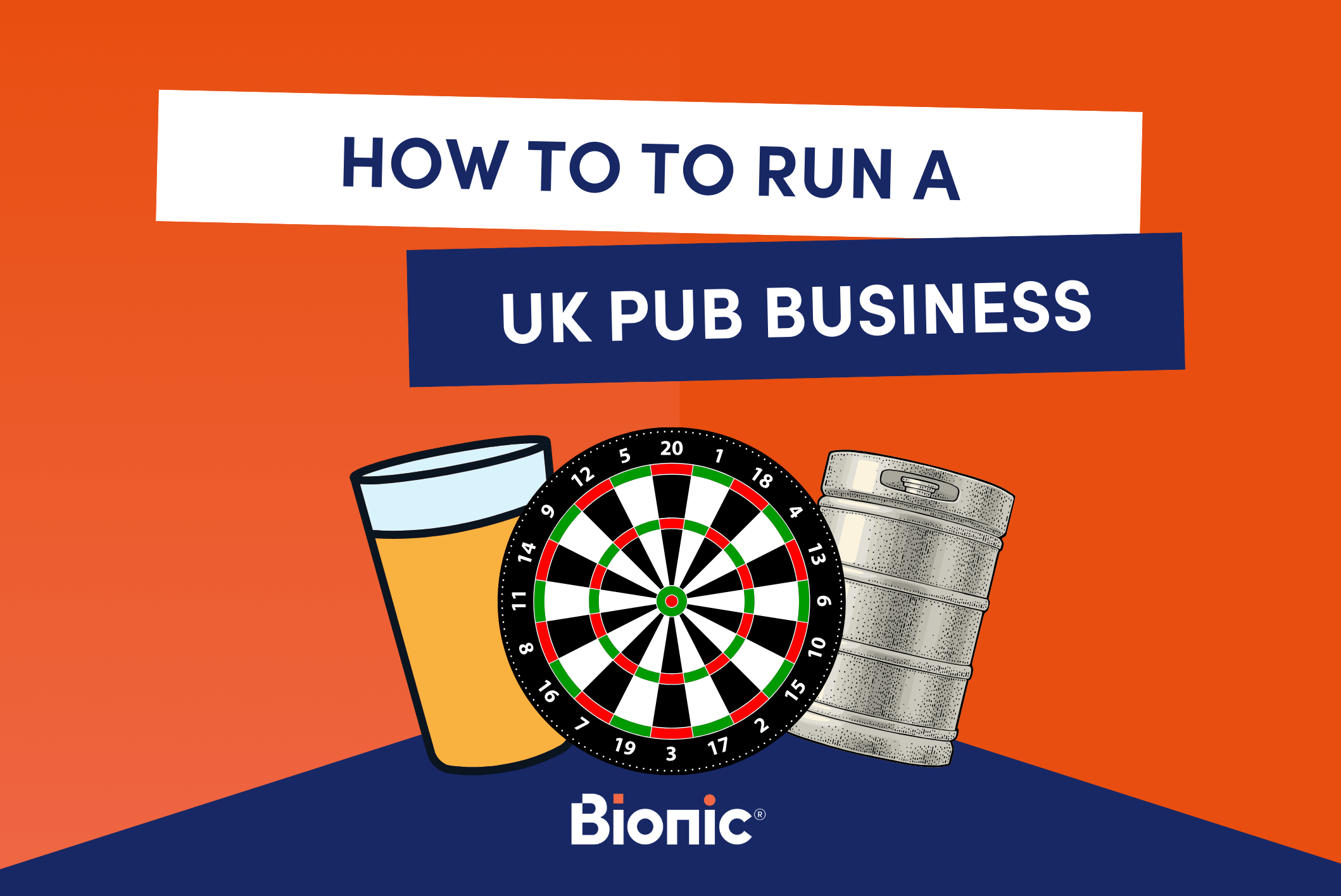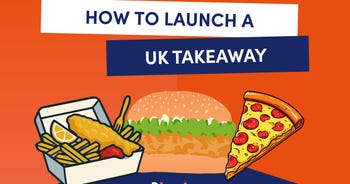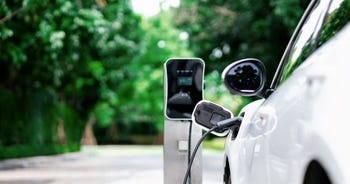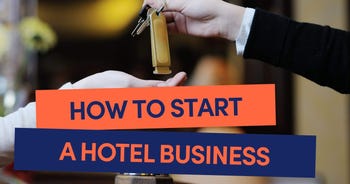How to set up and run a successful pub in 2025/2026
Running a pub represents one of the most rewarding business ventures in UK hospitality. In the UK, we love our pubs, so much in fact we have around 40,000 of them. This social venture attracts small business owners who want to get involved with their local community AND run a business. If this is you, then we can help you get started. Whether you want to set up a local, a microbrewery, or a franchise with no experience – keep on reading.

How much money do I need to start and run a pub?
The first thing on your mind when thinking of setting up a pub is likely – how much is it going to cost? Starting up any business needs an upfront investment and an ongoing financial commitment.
It’s a good idea to get to grips with understanding these costs to help you plan. Consider everything from the first bits of paperwork to the pub opening, while avoiding any common cash flow problems from those who have done it before.
What are the start up costs?
Most pub tenancies require a bit of a hefty deposit, and this can be from around £20,000 for a tenancy to thousands more, depending on the property size. Your initial deposit secures your tenancy agreement and covers initial setup costs. But that’s not all to think about, you'll need working capital to cover the first few months of operations while you get your name out there and build up your customer base.
If you want to buy a pub outright, this is a much larger investment, typically ranging from £200,000 to more than £1 million depending on your location and the condition of the property.
For example, a rundown pub in need of refurbishment could cost you around £170,000 if you want a project in the Midlands. In Greater London, you could be looking at over £1,000,000 for a pub in decent condition.
Although you’d own the pub outright, it’s also more of a riskier approach.*
*This information is for educational purposes only. Bionic does not give financial advice. Always consult your own financial advisor for financial advice.
Pub business rates
One of the biggest expenses is likely to be business rates.
Business rates are a tax on property used for business purposes, including pubs.
They are calculated by using a multiplier. The rateable value of your business property is multiplied by this number to give you your final bill.
Pubs fall under the Business Rates Relief Scheme, so if you’re eligible, you could get 40% off your business rates bills for the 2025 to 2026 billing year (April 1, 2025 to March 31, 2026). The most you can get in relief each billing year is £110,000 per business.
You can check out the government website for more information on business rates.
Insurance costs
The right insurance cover is essential if you serve customers daily. You can sort this up to 30 days before you open to avoid being underinsured when you start trading.
But what insurance do you need?
Employers’ liability insurance is a legal requirement if you have any employees, but there are other covers to consider like business equipment, stock and contents to protect your business operations.
Pub insurance through Bionic can cost from £2.44 per day*
*The price is based on the average of the bottom 10% of E-Trade policy invoices, on a rolling year basis between 01/07/24 & 30/06/2025, provided by Bionic. The per day figure is based on an average of 30 days. Your actual price may vary.
Energy costs
Once you’ve moved into your premises, you’ll need to sort out a commercial energy contract for your pub. You’ll want to think about what type of contract you want to opt for as these differ from domestic contracts. See the latest business energy rates..
You’ll also want to make sure you’re set up to be run as energy efficient as possible to avoid high consumption and expensive bills. Think about energy-efficient lighting and equipment – especially if you plan on serving food. Start up and switch off times should also be a consideration, right from the get-go.
Equipment and setup expenses
You’ll need to get your key equipment sorted before you open up. Your bar equipment can quickly add up, so where you can, you might want consider second hand equipment. Here’s an example of what you might need:
| Equipment | Costs | Second hand options |
| Bar EPOS System | From £0 - £69 - Square - Good for bars From £59 - Lightspeed - Customisable From £29 - Zettle – Good value | You may be able to find used systems on eBay |
| Commercial kitchen equipment (if you want to serve food) | A basic setup can cost between £10,000 and £20,000 for commercial fridges, sinks and grills. For a fully kitted out kitchen you could expect to pay around £50,000
| Caterquip offer tested second-hand commercial kitchen gear, often at a large discount. |
| Cellar coolers and racks | From £475 - Fridge Freezer Direct - Bottle cooler From £1,428 - Carlton Services - Cellar Coolers | Try Gumtree, Second Hand Pub Equipment and eBay for used items. |
| Bar furniture | From around £100 - Andy Thornton - New, stylish furniture | City Furniture Clearance have a good selection or try Facebook marketplace |
| Glassware & Barware | From £2.99 – Garage Bar - Branded beer glasses From £2.95 - Drinkstuff - Wine glasses
| Find second hand pint glasses and more on secondhand-catering-equipment.co.uk |
| Lighting and Decor | From £25 - Industville – Industrial style lighting From £108- Fritz Fryer – Stylish hanging lighting | Combine new lighting with vintage decor found via used pub fitters or eBay. |
Are there any legal requirements I need to be aware of?
Operating a pub legally requires multiple licenses and you need to comply with regulations, read on.
Sorting licences
Every pub needs a premises licence, with application costs ranging in different bands that is dependent on your rateable value. This licence means you can sell alcohol during permitted hours, entertainment activities, and capacity limits. You can apply through your local council to get this.
You also need a personal licence costing around £37 to apply. Using a simple form on the government site, you can apply for this.
Learn more about which businesses licenses you need for a pub.
Health and safety regulations
Although you don’t directly need a license for health and safety, if you’re serving food you do need to register with your local authority and maintain food hygiene standards in line with Food Standards Agency requirements. You also need to train your staff, giving proper food safety training.
Employment and VAT
If your business exceeds an annual turnover of VAT £90,000 – you need to register for VAT. While you’re under this amount, you can still register for VAT, but it’s not mandatory.
When it comes to employees – you’ll need to make sure you’re following employment law, using your ERN number and paying minimum wage and sorting out pension auto-enrolment for eligible staff. Learn how to manage staff.
Should I choose a tenancy, lease, or freehold premises?
When it comes to choosing how to set up your pub – the choice you make can really impact the freedom you have to run your pub. Each option has its benefits and drawbacks. Let’s take a look.
Brewery tenancy agreements
Sometimes cause tied agreements, brewery tenancy agreements are common with major brewery groups. These agreements typically mean it's easier to invest, but you have limited choice of beer suppliers. In some cases, tenants must buy the beer and cider and other types of alcohol from the brewery who owns the property.
These types of tenancy agreements usually run between 10 and 20 years, with break clauses allowing tenants to end the agreement under certain circumstances. Companies like Fullers, Star Pubs and Joules offer these.
Leasehold pubs
A leasehold pub can offer greater freedom on how you want to run your pub, but it comes at a bit more of a price. Think of it like renting, like you would a flat - its yours to run, but you can’t redecorate. You'll typically pay market rent plus other fixed costs like business rates, insurance, as well as maintenance costs to keep your pub in top shape.
Unlike a tied agreement, you’ll probably have more supplier freedom so you can get in the brands you specifically want, including smaller, independent breweries. This also means you can decide on your pricing, potentially bringing in more profit.
Freehold ownership
When you own a pub outright – this is a freehold ownership. Freehold ownership gives you complete control over running your pub. You can choose the suppliers you want, without going to a landlord for approval. The main downside is you need a lot of money to buy a pub outright and it can be a risky venture when you’re just starting out.
If you have the cash but you’re not sure. It might be a good idea to start with a tenancy agreement or lease first and grow your business before you decide to purchase a pub outright.
How can I make sure my pub attracts customers and makes money?
Let’s be honest, you need a profitable pub to be successful. And this depends on how you run it, train your staff, and the space and community you create.
Kate, owner of The Old Ivy House in London, told us “To draw people in, we initially decided to try a comedy show, so we sourced a comedian who curated our nights for us. We did that for about six months, and it was great to begin with, we were getting a full pub on a Saturday night,” Kate explains, “but then towards the end, when we'd become a bit more popular anyway, we were essentially kicking out locals so other customers with tickets could come in. So, we decided to move on from the comedy. But we always come up with different ideas,”. Read Kate’s full customer story.
Reddit users who run local pubs, have more advice on how to run a pub successfully:
- Find a gap in the local market – you’ll want to stand out against longstanding competitors as it’s going to be hard to steal business
- Make your customers feel safe – have a zero-tolerance stance on drugs and violence, to ensure customers of all ages feel safe! Also, keep the place clean.
- Make your pub a hub for locals – Get involved with the local community, host regular quiz nights, music nights and social events.
- Hire friendly staff to get to know regulars – Your employees are your greatest asset, hire an attentive, professional team that give something back to your regulars.
And arguably the most important of all...
Understand the financial reality
Many Reddit users advise that running a pub is tougher than it seems – your heart really needs to be in it as financial risks can be high.
In fact, pubs have been declining in the UK since the 90’s for several economic and cultural reasons. Learn more in our pub report.
The drink vs food balance
When it comes to what you offer your punters – you need to get the balance right.
Most pubs offer snacks like crisps and nuts, but if you want to offer food – this requires even more of an investment and a thought-out strategy.
It might be a good idea to start with bar snacks, before you opt for a full-blown menu, so you can gauge interest from your customers and avoid waste.
Selling food could generate higher profit margins than alcohol while attracting customers during quieter periods. But it does mean you need to kit out your kitchen with fryers, fridges and a lot more expensive equipment and additional kitchen staff, so think wisely
You’ll also need to think about the additional insurance for running a kitchen and the risks that come with it, as well as higher energy consumption which can start to rack up your bills.
Learn more about how to price your products.
Getting the pint price right
What will you charge against your competitors? The right pricing should keep you profitable and keep customers happy.
A good way to start with pricing is working out your ‘pour cost’.
Imagine a drink you sell for £10. If the ingredients use to make that drink cost you £2, then your pour cost would be 20% (£2 / £10 = 0.20, or 20%)
Pour costs are a good way to track if you’re pints are profitable. A lower pour cost generally means a higher profit margin for your drinks.
When it comes to pricing pints, you’ll want to know what competitor are charging in your area to ensure you’re competitive.
We went out on the streets to see what people had to say about the price of a pint in the UK, watch now to help with some research.
Online marketing and community
No one wants an empty pub – to get punters in and coming back it’s essential to have an online presence.
Ensure you have a page on all major social media platforms, ensure you have a website with your opening times and an updated menu with all allergens listed (if you sell food). These days, it's the norm to check the menu before you go and eat anywhere – even pubs.
To get your marketing off the ground – invite people with influence, creators who run lifestyle, drinks or food pages on social media. You could even hold a launch party.
Partner with local businesses, sports clubs, and community groups to establish your pub as a neighbourhood hub and get the word out that you’re open!
Word-of-mouth is one of the most powerful marketing tools in the pub industry. Focus on consistently excellent service, quality products, and creating memorable experiences that customers will go and tell their friends and family about.
Train your staff to hold standards
Opening weeks can be tricky in hospitality so to avoid any mishaps, ensure you train your staff before they start. Make sure they have product knowledge, good customer service and know how to deal with busy periods.
Create clear procedures for handling difficult situations, including intoxicated customers, disputes, and emergencies. Well-trained staff become brand ambassadors who genuinely contribute to your pub's reputation and success.
Last but not least, pay them well and treat them fairly to reduce the likelihood of staff turnover.
What are the biggest challenges and how can I overcome them?
Challenges are common in any business, pubs no exception. Understanding these could mean you’re more prepared if they do arise.
Rising costs and financial pressures
- Energy costs have been anything but steady of the last few years, so you need to be ready for any potential volatility, as there is limited government support for businesses to pay energy bills.
- Inflation, supply chain disruptions can affect the prices your suppliers set, so it’s important to regularly review your prices and supplier costs to maintain profitability.
- Monitor cash flow carefully, particularly during quieter winter months when heating costs peak while customer numbers often decline. Make sure you have enough working capital reserves to handle unexpected expenses or temporary revenue reductions, aim for at least three months.
Recruitment can be difficult
The hospitality industry has been facing some ongoing recruitment challenges, with competition for finding quality staff getting worse post-pandemic.
- To set yourself apart from competitors, try to offer flexible working patterns and genuine training opportunities and great working conditions, even if you can’t afford to pay them more than minimum wage.
- Even considering workplace health insurance schemes like Vitality at work can be a great benefit for your team and don’t have to cost you the earth. Think about offering free food and discount for friends and family as well to make them feel valued.
- If you’re struggling to find staff, consider apprenticeship schemes and partnerships with local colleges to give young talent a chance.
Changing consumer habits
Gen Z is drinking 28% less than older generations did at their age, according to a study, which is in-line with the growing trend of ‘sober curiosity’ - where people are drinking less for wellness or personal reasons.
28% of UK young also adults don’t drink, the same study suggests. Being sober is becoming more socially acceptable, so instead of alienating these customers, make sure you offer a non-alcoholic and 0% beer option to cater for this growing market.
People deciding to ‘stay in’ is also challenging for traditional pubs. Try to offer experiences that are unavailable at home like live entertainment, quality food, and community atmosphere that is inviting for friends and family to plan a day/evening out.
Planning for seasonal dips
Pubs can be a seasonal business, with summer normally generating peak revenue than winter periods – but that doesn’t mean you can’t brand your pub for summer and cosy winter nights.
Build relationships with local event organisers, wedding planners, and corporate clients to help generate more revenue during quieter periods.
Advertising private hire can also provide another income stream.
Get your pub on its feet with help from Bionic
Ready to launch your pub business? At Bionic, we’re here to help with your business basics like energy, insurance, broadband and finance. We work with a panel of trusted suppliers and providers to get you a competitive deal. Get in touch by starting a quote online today. Or read more on business essentials from learning about tax returns to making staff redundant.







